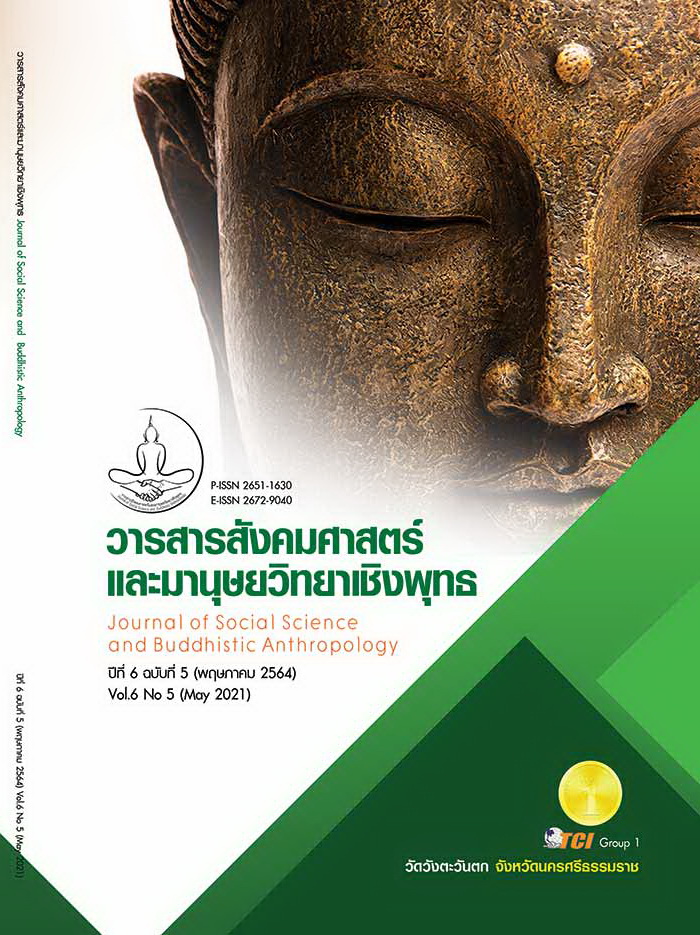FACTORS AFFECTING THE SUCCESS OF THAI BEEKEEPERS IN BEEKEEPING
Keywords:
Success of Beekeeping, Thai Beekeepers, Ecological EquilibriumAbstract
The Article research was objectives 1) Objective to study the level of farmers qualification Bee worker management Ecological balance, marketing effect 2) to study the components that affect success And 3) to study the development of patterns affecting the success of beekeeping among Thai beekeepers. This research uses a combination of research methods. The quantitative data were collected from 300 beekeepers in 4 provinces. Sampling was stratified using a questionnaire based on 20 times criteria, 15 variables. The method was used and analyzed by a structural equation model. Qualitative, in-depth interviews with 15 key informants - farmers, beekeepers and successful people - were determined, and analyzed and presented descriptive data. The research findings showed that: 1) beekeepers’ qualifications, beekeeping management, ecological equilibrium and marketing performance were rated at a high level whereas the success of beekeeping of Thai beekeepers was at the highest level; and 2) ecological equilibrium had the greatest overall influence on the success of beekeeping of Thai beekeepers, followed by beekeeping management, beekeepers’ qualifications, and marketing performance, respectively; and 3) The relational model of side components Farmer qualifications Bee worker management Ecological balance And the effect of marketing on the success of beekeeping of Thai beekeepers is a guideline for the development of a complete beekeeping career that will lead to sustainable success in the future. Lead to the development of beekeeping effectively and to promote sustainable quality of life for farmers Success in beekeeping at the highest level the rest is at a high level
References
ณรงค์ กุลนิเทศ และสุดาวรรณ สมใจ. (2558). ระเบียบวิธีวิจัยชั้นสูง และการออกแบบวิจัย. (พิมพ์ครั้งที่ 2). กรุงเทพมหานคร: มาสเตอร์พรินท์ สามเสน.
ธงชัย สันติวงษ์. (2543). การบริหารเชิงกลยุทธ์. กรุงเทพมหานคร: ไทยวัฒนาพานิช.
นิภาภรณ์ จงวุฒิเวศย์ และคณะ. (2553). ปัจจัยที่ส่งผลต่อความสำเร็จในการดำเนินงานของธุรกิจชุมชนในเขตอำเภอเมือง จังหวัดร้อยเอ็ด. วารสารมหาวิทยาลัยราชภัฏมหาสารคาม, 4 (12), 103-111.
ปาริชาติ วลัยเสถียร และคณะ. (2546). กระบวนการและเทคนิคการทำงานของนักพัฒนา. (พิมพ์ครั้งที่ 2). กรุงเทพมหานคร: โครงการเสริมสร้างการเรียนรู้เพื่อชุมชนเป็นสุข (สรส.).
ภรณี มณีโชติ และคณะ. (2563). การวิเคราะห์โซ่คุณค่าของการเลี้ยงผึ้งแบบธรรมชาติในพื้นที่ป่า: กรณีศึกษาชุมชนห้วยหินลาดใน อำเภอเวียงป่าเป้า จังหวัดเชียงราย. วารสารวนศาสตร์ไทย , 39 (1), 165-175 .
วันชัย สุขตาม. (2560). การบริหารจัดการทรัพยากรธรรมชาติและสิ่งแวดล้อม: จากบริหารจัดการทรัพยากรธรรมชาติและสิ่งแวดล้อม. วารสารมหาจุฬาวิชาการ, 1 (1), 101-110.
วิทวัส ยุทธโกศา. (2558). เลี้ยงผึ้งเพื่อการประกอบอาชีพ. [รายการวิทยุ]. เรียกใช้เมื่อ 17 ตุลาคม 2562 จาก https://www3.rdi.ku.ac.th/?p=19082
สมชาติ กิจยรรยง. (2561). กลยุทธ์ทางการตลาดสำหรับผู้บริหาร. กรุงเทพมหานคร: ส.เอเชียเพลส (1989).
สิริวัฒน์ วงษ์ศิริ และสุรีรัตน์ เดี่ยววาณิชย์. (2555). ชีววิทยาของผึ้ง. (พิมพ์ครั้งที่ 3). กรุงเทพมหานคร: วี.พริ้นท์ (1991).
สุทธิชัย สุทธิวราภิรักษ์ และคณะ. (2550). สถานการณ์การเลี้ยงผึ้งในประเทศไทย. ใน เอกสารประกอบการสัมมนาแนวทางการเลี้ยงผึ้งสู่มาตรฐานฟาร์มผึ้ง. เชียงใหม่: โรงแรมเชียงใหม่ออคิด.
สุภมาศ อังศุโชติ และคณะ. (2554). สถิติวิเคราะห์สำหรับการวิจัยทางสังคมศาสตร์และพฤติกรรมศาสตร์ เทคนิคการใช้โปรแกรม LISREL. (พิมพ์ครั้งที่ 3). กรุงเทพมหานคร: เจริญดีมั่นคงการพิมพ์.
สุมิตร คุณเจตน์ และคณะ. (2560). ผลของการลดความชื้นต่อการคงคุณภาพของน้ำผึ้งชันโรง. วารสารแก่นเกษตร, 45 (ฉบับพิเศษ 1), 1355-1359.
Kotler, P. (1997). Marketing management: Analysis, planning, implementation, and control. New Jersey: Prentice Hall.
Kouchner, C. et al. (2018). Sustainability of beekeeping farms: development of an assessment framework through participatory research. In Conference: IFSA 2018: Farming systems facing uncertainties and enhancing opportunities. Chania, Crete Greece.
Nat, S. & David J. L. (2019). Considerations and Factors Influencing theSuccess of Beekeeping Programs in Developing Countries. Retrieved January 20, 2019, from https://www.tandfonline.com/loi/tbee20
Portney, L. G. & Watkins, M. P. (2015). Foundations of clinical research: Applications to practice. (3rded.). Philadelphia: PA: F. A. Davis Company.
The Center for People and Forests. (2017). Enhancing Livelihoods and Markets. Retrieved September 12, 2020, from https://archive.recoftc.org/basic-page/enhancing-livelihoodsand-markets.









